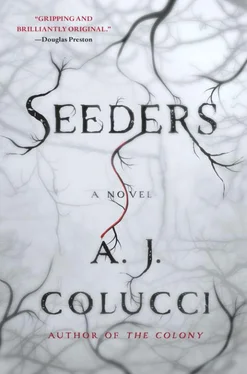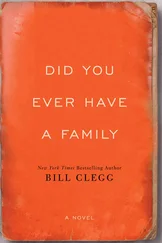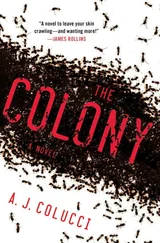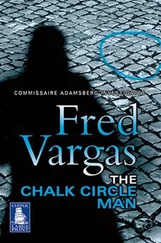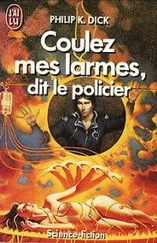George headed uphill against the gale, toward the cliffs known as High Peak. Some of the sharp things sticking out of his flesh became loose and fell to the ground, but the letter opener held firm in his gut, its handle whipping back and forth. The photo of the little girl curled inside his grip.
As he reached the summit, the wind became fierce, but the frigid cold did not register. Standing unsteadily, he looked down at the waves beating ferociously against the rocks. George knew at that moment, seven billion people were going to die, but he no longer cared. In fact, it all made sense now; everything was as it should be.
He opened his fist and the photo of the girl blew into the sea. George smiled peacefully. Arms spread-eagled, he leaned over the edge and dropped silently off the cliff. His head slammed against the jagged boulders, splitting his skull. His broken body tumbled in the waves.
ISABELLE MAGUIRE LOOKED UP from a potted begonia with a tiny gasp. The muscles in her body stiffened and her skin turned cold and clammy. It was the feeling a mother might get when a child goes missing at the mall. Across the room, twelve-year-old Sean was on the couch with his face in a book. His older brother, Luke, was in his bedroom with the door closed, radio blasting.
She clicked her tongue, shook off the feeling, and continued watering the plants; twenty-two species that covered every surface of her Brooklyn apartment. It was the third time this month Isabelle had one of these premonitions and the feeling lingered. She forced it from her mind and maneuvered around the stuffy living room, an obstacle course of potted ferns and rubber trees.
Isabelle returned to the kitchen, stifling hot from a roast in the oven, and blotted a towel across her forehead. She threw open the window and felt a cool breeze on her cheeks. It was dark outside and the lights of Montague Street were as bright and cheery as the sounds of laughter; couples strolling, families headed out for dinner, young people hitting the bars.
Isabelle tried not to look, listen, or even think about the streets below. Instead she drew her attention to the window box, where tiny green leaves were beginning to sprout, newly planted dill, basil, and parsley. She sprinkled the last drops of water on the dirt, closed the window, and locked it tight.
A bird trapped in a cage.
Dark, somber eyes stared back from the glass. Lack of sunshine had given her a milk-white complexion, but her dress was pressed, her makeup perfectly applied, and her long, black hair neatly coiffed. Not a strand out of place.
Hazy-eyed, she unconsciously wiped off the lipstick with the back of her hand.
The kitchen timer buzzed and Isabelle startled, checking her watch. It was nearly six o’clock and Colin liked dinner as soon as he came home. She removed the roast from the oven and filled the pitcher, rinsing the lipstick from her skin.
“Sean, come water your plants,” she called out gently.
Although only twelve, Sean was nearly as tall as his mother with the same dark hair and alabaster skin. He shuffled through the kitchen and took the pitcher without a word. Sean had not spoken since he was eight, the day he fell out of a tree. He had been such a terrific kid, smart and funny, incessantly talking. He knew Latin and played the violin in preschool, and at the age of six he could recite Shakespeare and pi to the thousandth digit. Like Isabelle, he had a passion for botany. He would spend hours a day collecting plants in the park, squishing them under newspaper and drying them between blotting paper. By the age of seven his collection contained half the native plant species found in New York City.
Then one day Sean was climbing a tree in Central Park, while Isabelle watched him, lost in thought. It was hard enough keeping an eye on Sean. The kid was so energetic, running from swings to monkey bars to treetops. But that particular morning, Isabelle had had a fight with her husband and didn’t hear her son’s cry for help. It was a mistake she would regret the rest of her life. Sean fell twenty feet to the ground. He awoke from a coma a completely different person. For the past three years, he went to special schools, grunted out frustrations, and used his own form of sign language. He sat in waiting rooms with vacant eyes and half-closed lids that gave him a sleepy, dim-witted expression, as he was paraded before an endless list of specialists.
Still, no one could tell Isabelle why her son was mute or why his IQ had sunk forty points. Tests showed he had made a complete recovery with no damage to the brain. Physically, there was no explanation for his condition.
Sean plodded around the living room, watering all the floor plants and his favorite, a holly bush. It had stayed colorful all winter, but now it was spring and the red berries had fallen off. Isabelle watched her son with both affection and remorse as she remembered the laughing, inquisitive boy who had been so small and agile. Now he was tall and plump, silent and somber. It seemed as if Sean had to concentrate on even small tasks like walking and breathing.
Soft. That’s how Colin described him. Isabelle’s husband didn’t like anything out of the ordinary and that included his children. A key fiddled in the door and she looked at the clock and frowned.
Colin strolled into the apartment, threw his jacket over a coat hook, and carefully unbuckled his holster. He slipped a Glock pistol and his police badge into a bureau drawer, locked it with a key, and went to the living room. He took off his shoes and sat down in an armchair, folding the evening paper and brushing his fingers down his tie to remove any sign of lint. It was an obsessive habit, a mark of fastidiousness.
As he opened the paper and flicked away invisible crumbs from his shoulder, his eyes lingered on Sean reading a book on wildflowers.
Isabelle thought she saw a look of disgust.
“So when’s his next appointment?” Colin asked her.
“I’m done with doctors. He’s been to dozens and there’s no consensus. I think he’s fine. He just needs—”
“Fine? He’s not fine .”
She leaned out of the kitchen doorway, clutching a spoon. “Could we not talk about this right now?”
Colin snapped open the newspaper and it swallowed him from view. “Did you get a box of cigars for the captain?”
“Yes.”
“Not smoke.com?”
She didn’t answer.
“Come on, Isabelle, get some freaking air.”
“I’m just busy.”
“You’re not busy. Tomorrow I want you to go to the cigar store on Bedford and pick out the expensive kind. The online stuff is crap. Do you hear me?”
“Yes.”
He put down the paper with a crunch, gazing around the room. “Jesus, why don’t we just grow our own tobacco? We’ve got every other plant. It’s like a jungle in here. Are you listening?”
“Yes.”
“I want you to start thinking about getting rid of half of these pots. You hear me?”
“Okay.”
“Especially these monsters on the floor.”
She poked her head from the doorway. “Those belong to Sean.”
Colin looked at his son and started to speak, but reconsidered.
Isabelle returned to the kitchen and scooped the string beans into a bowl and wondered, as always, how she had missed all the warning signs.
Colin was a rookie police officer when they met. To Isabelle he was the knight in shining armor she’d been waiting for, a ticket out of her mother’s house and away from a future going nowhere. The job became his life, and Colin steadily rose in rank to become the youngest detective on the force. Isabelle knew she would always come second to his career, but she never imagined he would bring the job home with him. Colin approached the marriage as though it were a homicide investigation. He scrutinized every problem, overexamined details, and spoke to his wife as if interrogating a witness. He instructed her on how to clean the house, raise the children, answer the phone, and even how to dress—in stylish skirts and high-heeled shoes.
Читать дальше
